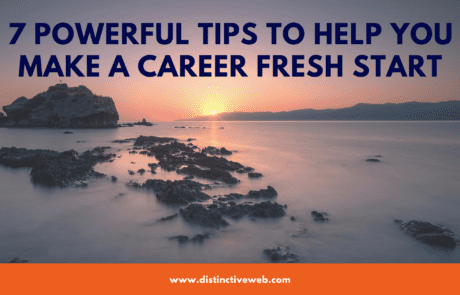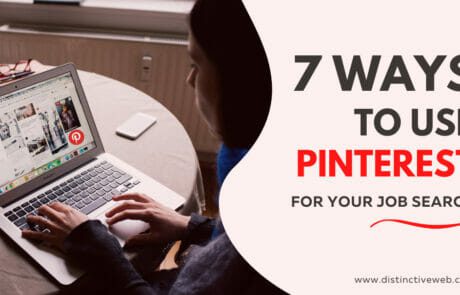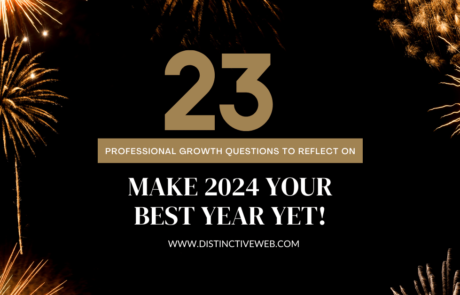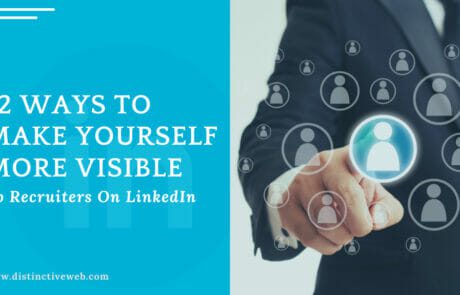
Making a good first impression is essential in any situation, but it’s especially crucial when job searching.
After all, you only get one chance to make a first impression on a potential employer, and first impressions are lasting impressions. This is true whether that first impression was a positive one or a negative one. You won’t get a second chance.
Whether conscious or subconscious, people form first impressions of you within just a few seconds. First impressions matter, and they matter a lot!
The Lasting Impact of First Impressions
Think of a job interview. If you botch a question, don’t show up on time, aren’t prepared, or arrive dressed unprofessionally, you will not get a do-over or a follow-up interview. The hiring manager will move on to the next candidate who is just as qualified as you but made a much better first impression.
Or, even if somehow you are still given a chance, despite a bad first impression, the other person will always regard you with doubt. No matter what concerns this bad first impression evokes, it will take much hard work to erase it if you are ever even able to do so.
The concept of shadowing explains this. Within just seconds of meeting another person, we form an opinion about them–a first impression. What we perceive in those first few seconds shades and influences all our future interactions with that person.
When you make a good first impression on a prospective employer, it shadows everything going forward.
For example, if your resume and LinkedIn profile make a great first impression before you ever even meet the hiring manager, then you stumble on a particular interview question, you’ll likely be given the benefit of the doubt. Your first impression shadows your minor mistake. You will also shine brighter in your successes, thanks to shadowing. That’s a great thing!
But shadowing also works against you. When you make a bad first impression by submitting a resume riddled with spelling errors, you’ll be conceived as careless and lacking in attention to detail, and that “bad shadow” moves right along with you through the hiring process. And that is assuming you even get any further in the process. Many times the bad first impression of a bad resume will halt things right there.
You can see how this first introduction and the impression you make can have far-reaching consequences – for good or for bad.
These are the reasons why it is so important to go the extra mile and do what you can to make a good first impression. Luckily, there are some things you can do to set yourself up for success. Keep reading for our top tips on how to make a good first impression during your job search.
1) Good Enough is Not Good Enough When It Comes To Your Resume
Your resume is your calling card in your job search. In most cases, it is the first introduction potential employers have to you. “Good enough” doesn’t cut it when it comes to your resume. To create a great first impression your resume must be top-notch.
Remember… your resume is competing against an entire horde of potential candidates, each wanting the same thing: That one specific job.
Unless your resume stands out from this crowded stampede and makes a great first impression on the hiring manager, it will be trampled to the bottom. It’s as simple as that.
There’s no welcoming handshake for the runners-up.
“Almost made it” won’t put money in your pocket or secure your future.
While you can try to write your resume yourself, and we’ve provided lots of great tips in this blog for DIYers, do you want to risk that all-important first impression?
Yes, working with a professional resume writer is an investment. But it is an investment that will pay off many times over in the great first impression equity it gains you. Book a resume writing consultation to learn more about our professional resume services.
2) Don’t Neglect Your Online Presence & LinkedIn
In today’s job market, your online presence is more important than ever. Employers are increasingly using social media to screen potential candidates, and LinkedIn is one of the most popular tools.
While LinkedIn has yet to replace the traditional resume, these days, there is a good chance that the very FIRST introduction that a potential employer has to you will be your LinkedIn profile. This is why writing a compelling, persuasive LinkedIn profile is as important as your resume.
If you’re not on LinkedIn, you’re missing out on a huge opportunity to advance your career and control the first impression and image potential employers form of you.
Having an online presence is essential in today’s job market. Even if they’ve received your resume first, the potential employer will Google you. If they can’t find anything about you online, that will not reflect well on you. LinkedIn gives you a chance to control what comes up when someone Googles your name. You can ensure that the first thing they see when they look you up is a professional profile showcasing your skills and experiences.
For most of our clients, we write both a resume and a LinkedIn profile, so ask us about this during your free consultation.
3) Your Online Presence Doesn’t End With LinkedIn
A large part of our daily lives and social and professional interaction now occurs on the Internet. We meet and communicate through social media, email, text messages, and video conferencing apps like Skype or Zoom.
As a result, the rules for making a good first impression have expanded. It is important to remember that first impressions will happen, and you may not know when. Even more importantly, you may not be actively involved in the process.
Online first impressions are often formed based on what you have on your social media sites. Not just on LinkedIn but also on Facebook, Twitter, and Instagram. People see these online properties, read about you, look at your images, and quickly form first impressions.
That’s why it is essential to keep track of all the “virtual real estate” you occupy and make sure the information is accurate and represents you well.
Don’t post unprofessional photos of the party you went to last week or of you in a skimpy bathing suit on the cruise you took as your last vacation. Avoid discussing politics or other controversial and polarizing topics.
Of course, you should carefully check your privacy settings and lock down your account. But even if you think your account is private, it may not be as private as you think. Be cautious!
4) Email Also Creates a First Impression
Email is another vital touchpoint that can make or break the first impression someone forms of you. Poor grammar and spelling mistakes will leave a negative first impression.
On the positive side, email gives you time to think about what you want to say and how you want to say it. You can polish your message until it’s just right.
Take your time writing, editing, and spell-checking every email you send. Just because it is digital doesn’t mean it needs to be casual. Err on the side of being too formal.
Online tools such as Grammarly can be beneficial when sending any email or drafting any other type of written communication.
An unprofessional email address is a fast way to destroy a first impression. If an employer receives an email from partyguy@email.com, what impression do you imagine they’d form? If you don’t have an email account for professional correspondence, create one.
Also, don’t forget to check your settings. Look at how your own “from” field is displayed. Make sure it makes sense and is appropriate for the circumstance. This will be a first and last name for most of us, but you may also wish to include any special credentials (e.g., M.D. or R.N.)
5) Do Your Research to Ace the Job Interview
With your new powerful and persuasive professionally written resume and LinkedIn profile, it won’t be long before you begin getting calls for interviews.
Before you walk into the room, make sure you know everything there is to know about the company and the position you’re interviewing for.
This research will help you answer questions more confidently and show the hiring manager that you’re genuinely interested in the company and the opportunity.
Visit the company’s website and read through its About Us page. Thoroughly familiarize yourself with their products and services. Read recent news releases. Find out who will be interviewing you and look them up on LinkedIn. The more you know, the better.
In your interview, mention specific things you like about the company and why you think you would be a good fit for the position. Demonstrate your genuine interest in working for the company and that you would be an asset to their team.

6) Ask Good Questions
When interviewing for a new job, asking questions is a great way to show hiring managers that you’re interested in the position and the company.
Prepare some questions for the interviewer ahead of time.
Avoid asking questions that could quickly be answered by doing a simple Google search; instead, focus on asking questions about the company culture, the team you’ll be working with, or the specific duties of the position you’re applying for.
Listen to the answers you are given and ask follow-up questions.
Hiring managers will be impressed with your thoughtful questions, giving them insight into whether or not you’re genuinely interested in the opportunity.
7) Dress the Part
Appearance matters. Studies show that people make snap judgments about others based almost wholly on appearance.
To make a positive impression, make sure you look presentable and professional. Be meticulous in your personal grooming.
Dress appropriately in business attire. That doesn’t necessarily mean you must wear a suit (unless the company culture warrants it). But for even the most casual workplace, you should at least be dressed in business casual attire.
Avoid anything too revealing, sloppy, or messy. You want the focus on your qualifications, not your fashion sense (or lack thereof).
8) Be On Time (or Early)
Punctuality is key when meeting someone, especially for a first meeting.
No one wants to wait for someone who isn’t considerate of their time. Lateness shows a lack of respect. Arriving early, even a few minutes early, is wise.
If you know there’s going to be traffic or some other obstacle that might make you late, give yourself extra time, so you don’t have to rush into the meeting frazzled and flustered.
9) Speak Clearly & Confidently
When meeting someone for the first time, speaking clearly is always important so they can understand what you’re saying and aren’t left guessing at words they couldn’t quite catch. This is especially important in an interview setting when every word matters.
In addition to clarity, confidence is also crucial. Speak with conviction about your skills and experience and why you’re excited about this particular opportunity.
It’s easy to get nervous and begin rambling. This can ruin a good first impression. Practicing your interview skills ahead of time with an interview coach or even just a friend or family member will help you avoid this problem. Always think before you speak.
10) Smile & Make Eye Contact
Be aware of your body language and facial expressions. Both are important when it comes to making a good first impression. Walk into the interview calm, confident, and engaged. If the interviewer reaches to shake your hand, return the gesture with a firm handshake.
Smiling is an easy way to make anyone feel more comfortable, especially if it is a genuine smile, but even if it’s just a nervous reflex smile upon entering the room.
Once you’re seated across from each other, remember to maintain eye contact throughout the conversation (without staring, of course). It shows that you’re engaged in what the other person is saying and will help them feel comfortable.
11) Follow Miss Manners’ Advice
Be familiar with and follow all the standard business etiquette. Good manners are essential when you wish to make a good impression. Avoid negativity. Don’t complain or be rude. Don’t fidget with your phone in any social or business setting. Don’t wipe your nose with your napkin. Don’t clean your teeth at the table. Respect the personal space of others.
12) Brush Up On Your Conversation Skills
An interview is not the only situation in which you must make a good impression. Successful job searching almost always includes professional networking, and networking means conversation.
Especially for people who are introverted or have any social anxiety, networking and holding an extended conversation can be challenging. Even small talk can be challenging if you are shy.
But, no matter how shy or introverted you are, there are strategies that you can learn to build rapport with anyone.
Your body starts communicating before you speak, so be aware of your body language. Pay attention to the other person’s body language as well, as this will provide you with non-verbal clues about how they feel about your interaction.
Prepare and think ahead about questions you might be asked. Read the day’s news, so you are informed on current events and prepared for small talk.
When job searching, you will almost surely be asked the common question: tell me about yourself. So plan ahead for this and be prepared with a compelling elevator pitch that you’ve practiced delivering with self-assurance. Here too, are some other job search scripts that you can adapt for other common situations.
Have a few good career-related stories ready to go too. You will need to think through your career success stories as you write your resume and LinkedIn profile. Adapt these for verbal telling and practice delivering them in a conversational tone.
Also, remember that a conversation is a two-way exchange. It isn’t all about you. Ask open-ended questions of the other person. Avoid asking questions that can be answered with just a word or two. This will help to keep the conversation going.
Give your conversation partner your complete and undivided attention. Be aware of your body language, maintain good eye contact, and stay focused. Be a good listener. People love to have conversations with those who truly listen and pay attention.
You’ll be amazed by how much this helps your conversational skills.
Final Thoughts About Job Searching & Good Impressions
Making a good first impression is essential in any and all situations and is especially important in your career. There are so many situations that you will encounter when job searching in which it is critical to make a strong first impression:
By doing your research ahead of time, dressing for success, speaking confidently, and being polite and professional throughout your interactions, you’ll be well on your way to impressing any potential employer. The tips in this post will help you approach all of these situations with confidence, and the more confident you feel, the better the first impression you leave.









